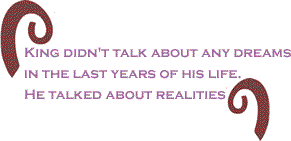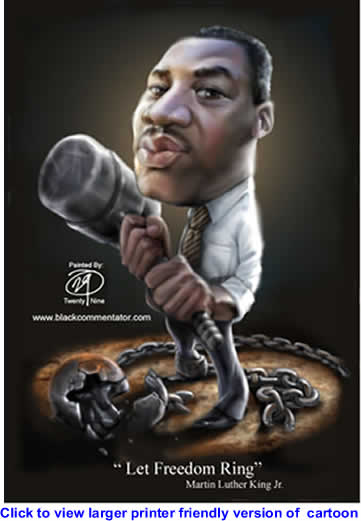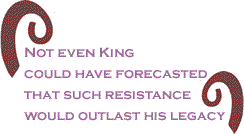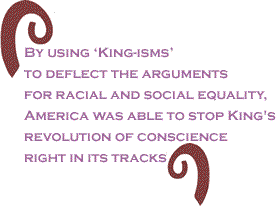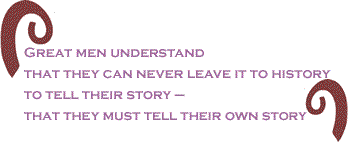
|
|||||||||||||||||||||
 |
|
|
As we approach a significant benchmark in the celebration of the King holiday, its 20th Anniversary, we should pay special attention to what King really stood for and how he's been "commercialized" in his afterlife. Signed into law in November of 1983, the first official "legal" holiday (off day) was Monday, January 20, 1986. King tried to bring America together via the politics of moral suasion - adherence to not only what is right, but what is just, justice being the standard for all that is right (not the other way around). What some think is right isn't always just, but what is just is always right. King understood that - America didn't, and 38 years after his death, 20 years of celebrating the message of America's Prince of Peace, leader of the non-violent social revolution whose life ended so violently, we are still grappling with issues of social injustice and economic inequality. And we're still waiting to get to "the promised land" that King prophesized we would reach without him ("I might not get there with you…"). King forecasted that the resistance to social change in America might outlast his life span. But not even King could have forecasted that such resistance would outlast his legacy.
The legacy of King has become so twisted that more white Republican conservatives spout "I Have Dream" and "We Must Be Judged, Not By The Color of Our Skin But, By The Content of Our Character" than socially conscious African Americans seeking to realize the achievement of King's "Promised Land." King "reasoning" has become King "rhetoric" as hostile forces use King's name, likeness, intellect and legacy to shift the social construct toward race neutrality and away from social justice. By using "King-isms" to deflect the same arguments for racial and social equality King made in his last two books, Why We Can't Wait and Where Do We Go from Here: Chaos or Community? (two books I read during every King week to not get caught up in all the "dream talk"), America was able to stop King's revolution of conscience right in its tracks. They took our focus off achieving equality, or reaching a "promised land," and put it on celebrating a holiday - in rhetorical ways that suggest that they too believe in King's "dream" of a colorblind society. Yet, colorblindness has become a barrier to discussion about what made the King phenomenon: racial inequality and social injustice. The desire to be a "colorblind society" called a halt to the discourse on race in America. Without being able to talk about race, you can’t talk about racial disparities, thus you can’t address racial inequities. But, we all profess to believe in the doctrine of King. Not really.
King is taken no more seriously in death than he was taken when he was alive. Even today, only half of America takes the day off for the King holiday - a truer testament to what they really believe, and a more telling insight to what African Americans let others believe about how King shook the foundations of race discourse in this nation. We've all, both Blacks and Whites (and everything in between) become consciously ignorant about the King legacy and what it stood for. King spent the last years of his life, as did Malcolm,
constructing an intellectual basis through which future generations
would interpret his mission and his messages. He was not ignorant
to the fact that if he, himself, did not craft the meaning of
his life and his work, it would be left to historical revisionists
to tell and it would be a whole lot different than he intended.
Great men understand that they can never leave it to history to
tell their story - that they must tell their own story. When you
read the two aforementioned books, you quickly recognize what
King was doing. Both books are rare, and extremely hard to find
- even in reprint - but you can find all kind of "dream"
books that romanticize both King and his
When you stand for nothing, you'll fall for anything. There are no limits to the depths Black America has fallen, is falling, and will continue to fall, without the courage to fight for better than what America has given it. Dr. Martin Luther King, Jr. said it best,
The Promised Land still awaits our arrival… Anthony Asadullah Samad is a national columnist, managing director of the Urban Issues Forum and author of 50 Years After Brown: The State of Black Equality In America (Kabili Press, 2005). He can be reached at www.AnthonySamad.com. |
|
| Home | |
Your comments are always welcome. Visit the Contact Us page to send e-Mail or Feedback or Click here to send e-Mail to [email protected] e-Mail re-print notice
If you send us an e-Mail message we may publish all or part of it, unless you tell us it is not for publication. You may also request that we withhold your name. Thank you very much for your readership. |
|
| January 12, 2006 Issue 166 |
||||||||||||||
|
||||||||||||||
|
||||||||||||||
| Printer Friendly Version in Plain Text or PDF format. Download free Adobe Reader. | ||||||||||||||
 |
||||||||||||||
 |
||||||||||||||
| |
||||||||||||||
| |
||||||||||||||






















